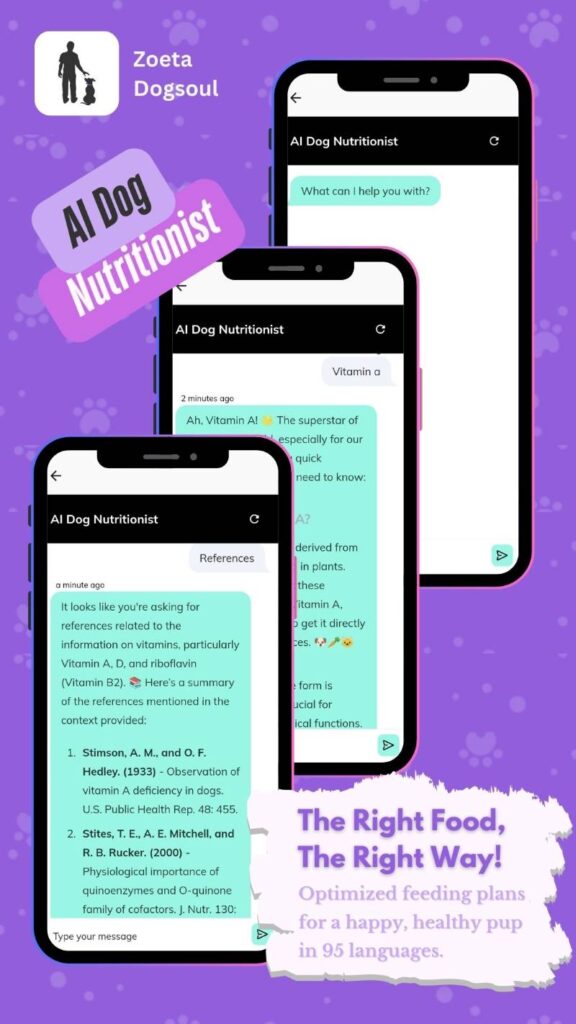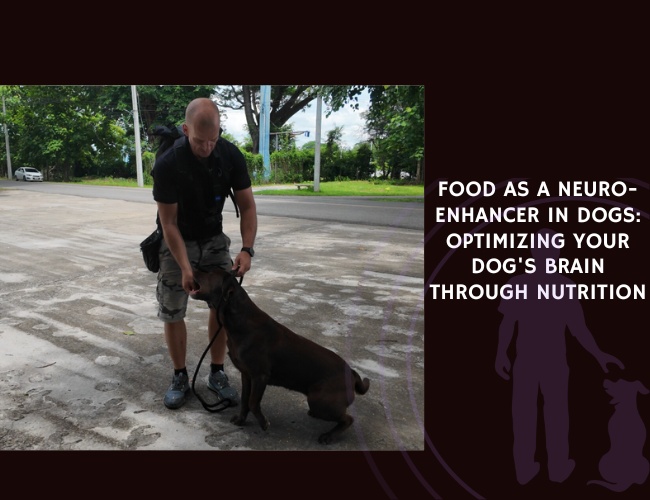Introduction: The Revolutionary Connection Between Your Dog’s Bowl and Brain
Did you know that what you put in your dog’s bowl could fundamentally transform their ability to learn, focus, and thrive? The emerging field of canine neuro-nutrition reveals that food isn’t just fuel—it’s a powerful tool that shapes your furry friend’s cognitive abilities, emotional stability, and training success. From the omega-3 fatty acids that build better brain connections to the amino acids that regulate mood and attention, every meal presents an opportunity to enhance your dog’s mental performance.
As we dive into this fascinating intersection of nutrition and neuroscience, you’ll discover how simple dietary adjustments can unlock your dog’s cognitive potential. Whether you’re working with a high-energy agility competitor, a focused service dog, or simply want to help your beloved companion learn more effectively, understanding the brain-food connection will revolutionize how you approach both feeding and training. Let us guide you through the science and practical applications that can transform mealtime into brain-time for your four-legged friend. 🧠
Character & Behavior: How Nutrition Shapes Your Dog’s Personality
The Neurotransmitter Symphony
Your dog’s personality isn’t just genetics—it’s chemistry in action. Every tail wag, focused gaze, and impulse to chase that squirrel stems from a complex orchestra of neurotransmitters firing in their brain. What’s remarkable is how directly their diet conducts this symphony.
When you feed your dog foods rich in tryptophan (found in turkey, eggs, and certain fish), you’re providing the building blocks for serotonin—the “happiness hormone” that promotes behavioral stability and impulse control. Research on sled dogs has shown that dietary tryptophan supplementation leads to increased post-meal serotonin levels, creating calmer, more focused animals ready to learn. This means that anxious or reactive dogs might benefit from strategic dietary adjustments that support their serotonin pathways.
The ADHD Connection
Recent groundbreaking research has identified fascinating links between diet and ADHD-like behaviors in dogs. German Shepherds displaying attention deficits and hyperactivity showed specific patterns in their tryptophan metabolism, with certain metabolites (3-indolepropionic acid and kynurenic acid) correlating directly with behavioral scores. This discovery suggests that what might seem like a “badly behaved” dog could actually be experiencing a nutritional imbalance affecting their brain chemistry.
Building Behavioral Stability Through B Vitamins
The B-vitamin complex—particularly B6, B12, and folate—plays a crucial role in maintaining your dog’s cognitive performance and emotional equilibrium. These vitamins work behind the scenes to regulate homocysteine levels, support neurotransmitter synthesis, and maintain healthy brain function. Dogs with adequate B-vitamin intake show better memory recall, sustained attention, and processing speed. You might notice this as your dog remembering commands more readily or maintaining focus during longer training sessions. 🐾
Vocalization & Communication: Understanding How Nutrition Affects Your Dog’s Expression
The Stress-Communication Link
When your dog’s cortisol levels spike due to dietary imbalances or unstable blood sugar, their communication patterns change dramatically. You might notice increased whining, excessive barking, or difficulty settling—all signs that their internal chemistry is affecting their ability to express themselves appropriately.
Diets that promote stable blood glucose create a foundation for clearer communication. Dogs experiencing the peaks and valleys of blood sugar fluctuations often display frustration behaviors: demand barking, inability to wait patiently, or excessive vocalization when excited. By choosing low-glycemic foods that release energy slowly, you’re giving your dog the metabolic stability needed for measured, appropriate communication.
Serotonin and Social Signals
The serotonin boost from tryptophan-rich diets doesn’t just calm your dog—it enhances their ability to read and respond to social cues. Dogs with balanced serotonin levels display more nuanced body language, from that relaxed tail wag that tells a story of contentment to the soft eye contact that builds trust. This neurochemical balance allows them to communicate their needs without resorting to extreme behaviors.
Training & Education: Dietary Protocols for Enhanced Learning
The Omega-3 Advantage
The balance between EPA and DHA omega-3 fatty acids represents one of the most powerful nutritional tools for enhancing your dog’s learning capacity. While EPA can initially impair learning when given alone, DHA counteracts these effects and promotes neurogenesis—the birth of new brain cells. This delicate balance, similar to that found in marine fish oil, creates an optimal environment for memory consolidation and skill acquisition.
For training purposes, this means supplementing your dog’s diet with high-quality fish oil (at the right EPA:DHA ratio) could significantly improve their ability to learn new commands, remember complex sequences, and adapt to novel situations. You might notice your agility dog mastering new obstacle combinations more quickly or your puppy grasping house training concepts with less repetition.
Pre-Training Meal Strategies
The composition of your dog’s pre-training meal can make or break a learning session. Research on working dogs reveals that low-carbohydrate, high-protein meals offer distinct advantages: higher nutrient digestibility, slower glucose release, and improved sustained attention. This metabolic profile translates to a dog who can maintain focus throughout an entire training session without the distractibility that comes from blood sugar crashes.
Consider this practical application: feeding your dog a protein-rich meal (like lean chicken with a small amount of sweet potato) 2-3 hours before training provides steady energy without the hyperactivity spike of high-carbohydrate foods. The result? A dog with better impulse control, reduced reactivity to distractions, and enhanced ability to process and retain new information.
The Focus Diet Protocol
For dogs struggling with attention deficits or hyperactivity, a comprehensive “focus diet” can serve as a powerful adjunct to behavioral therapy. This specialized approach targets multiple neurochemical pathways simultaneously:
- Morning Foundation: Start with a breakfast rich in complex proteins and moderate healthy fats, ensuring stable morning energy
- Tryptophan Timing: Include tryptophan-rich proteins in the evening meal to support overnight serotonin production
- B-Vitamin Boost: Ensure daily intake through whole food sources or appropriate supplementation
- Omega-3 Integration: Consistent daily supplementation with balanced EPA:DHA ratios
This protocol has shown particular promise for dogs with ADHD-like behaviors, addressing the underlying metabolic factors that contribute to attention difficulties. 🧡

Performance & Activities: Fueling Peak Cognitive Function
The Working Dog Advantage
Service dogs, police K9s, and competitive agility dogs operate at cognitive levels that would exhaust the average pet. Their brains process information rapidly, make split-second decisions, and maintain focus despite intense distractions. Research shows these elite performers benefit from specialized nutritional protocols that go beyond standard dog food.
Working farm dogs on ultra-low carbohydrate, high-fat diets demonstrated increased activity levels despite lower glucose readings, suggesting remarkable metabolic flexibility. However, the relationship between diet and performance is nuanced—while these dogs maintained high physical activity, their interstitial glucose concentrations still correlated positively with activity levels, indicating that cognitive tasks might have different fuel requirements than purely physical ones.
Competition Day Nutrition
For dogs competing in obedience, agility, or other cognitive sports, strategic feeding can provide a competitive edge:
- 72 Hours Before: Begin increasing omega-3 supplementation to optimize brain function
- 24 Hours Before: Ensure consistent meal timing to maintain circadian rhythm stability
- Day of Competition: Provide a easily digestible, moderate-protein meal 3-4 hours before competing
- Post-Performance: Within 30 minutes, offer a small amount of easily digestible protein to support recovery
Cognitive Endurance Training
Just as marathon runners need specific nutrition for endurance, dogs engaged in prolonged mental work require dietary support for cognitive stamina. The key lies in maintaining stable brain glucose while supporting neurotransmitter production throughout extended training or working sessions. This means strategic use of medium-chain triglycerides (found in coconut oil) for quick brain energy, combined with slow-releasing complex carbohydrates for sustained performance.
Nutritional Recommendations: Building Your Dog’s Brain-Boosting Diet
The Foundation Foods
Creating a neuro-enhancing diet starts with selecting the right foundation ingredients. Your dog’s brain thrives on specific nutrients that support everything from neurotransmitter production to cellular membrane health:
Protein Powerhouses:
- Wild-caught salmon (optimal omega-3 profile with balanced EPA:DHA)
- Turkey (rich in tryptophan for serotonin production)
- Eggs (complete protein with choline for memory)
- Lean grass-fed beef (B12 and iron for cognitive function)
Brain-Boosting Carbohydrates:
- Sweet potatoes (steady glucose release, rich in B6)
- Blueberries (antioxidants protecting neural tissue)
- Pumpkin (fiber for gut-brain axis health)
- Quinoa (complete protein with sustained energy)
Cognitive Support Supplements:
- Fish oil (1000mg per 30 pounds body weight, with 2:1 DHA:EPA ratio)
- B-complex vitamin (especially for senior dogs or those showing cognitive decline)
- Probiotics (supporting the gut-brain connection)
- MCT oil (quick brain energy for working dogs)
Meal Timing and Circadian Optimization
Your dog’s feeding schedule acts as a powerful zeitgeber, synchronizing their internal clock with optimal learning periods. Research on circadian rhythms reveals that feeding times directly influence molecular clocks in the brain, affecting when your dog is most receptive to training.
The optimal feeding schedule for cognitive enhancement follows these principles:
- Morning Meal (7-8 AM): Larger portion, protein-focused to support daytime activity
- Evening Meal (5-6 PM): Moderate portion with tryptophan-rich proteins
- Training Treats: Limited to 10% of daily calories, choosing single-ingredient options
This schedule aligns with natural circadian patterns, supporting metabolic processes during rest while maintaining stable energy during active periods. Dogs following this pattern show improved focus during morning and early afternoon training sessions—their cognitive “prime time.”
Special Considerations for Different Life Stages
Puppies (8 weeks – 12 months): Developing brains require higher DHA levels for optimal neural development. Consider puppy foods fortified with DHA or supplement with fish oil specifically formulated for growing dogs. Frequent small meals maintain stable blood glucose crucial for learning during this critical period.
Adult Dogs (1-7 years): Focus on maintaining optimal neurotransmitter balance through consistent nutrition. This is when dietary interventions can have the most dramatic impact on training success and behavioral stability.
Senior Dogs (7+ years): Increase antioxidants and B-vitamins to combat cognitive decline. Consider adding MCT oil for additional brain energy and maintaining higher protein levels to preserve cognitive function. 🐾
Focused. Balanced. Sharp.
Food powers the brain. Every nutrient your dog consumes becomes part of the neurological symphony shaping mood, focus, and behavior. When meals deliver the right building blocks, learning and emotional stability naturally follow.
Chemistry explains reactivity. Low serotonin, disrupted tryptophan metabolism, or B-vitamin deficiencies can mimic restlessness and poor attention. What looks like misbehavior may actually be biochemical imbalance.



Nutrition unlocks potential. By aligning diet with neurobiology, you transform training from struggle to flow. Each bowl becomes a tool to sharpen focus, reduce anxiety, and strengthen the bond between you and your dog.
Health Concerns: When Nutrition and Neurology Intersect
The Inflammation-Cognition Connection
Chronic inflammation doesn’t just affect your dog’s joints—it directly impacts their brain function. Diets high in processed ingredients, excessive omega-6 fatty acids, or foods that trigger allergic responses create systemic inflammation that impairs cognitive performance. You might notice this as “brain fog” in your dog: slower response to commands, difficulty learning new tasks, or increased anxiety.
Anti-inflammatory nutrition becomes crucial for maintaining cognitive health. This means prioritizing omega-3 fatty acids, avoiding common allergens if your dog is sensitive, and including natural anti-inflammatory ingredients like turmeric (with black pepper for absorption) and green-lipped mussel.
Blood Sugar Dysregulation and Behavioral Issues
Unstable blood glucose doesn’t just affect diabetic dogs—even healthy dogs can experience cognitive and behavioral impacts from glycemic volatility. Signs include:
- Irritability or aggression before meals
- Difficulty settling after eating
- Inconsistent training performance
- Excessive attention-seeking behaviors
Managing this requires careful attention to glycemic index: choosing complex carbohydrates over simple sugars, avoiding large meals that spike insulin, and potentially implementing more frequent, smaller feedings for sensitive dogs.
Gut-Brain Axis Disruption
The connection between your dog’s digestive health and their cognitive function is more profound than most owners realize. The gut produces numerous neurotransmitters, including 90% of the body’s serotonin. When digestive health suffers—through poor diet, antibiotics, or stress—cognitive function inevitably follows.
Supporting the gut-brain axis means:
- Including prebiotic fibers (from sources like chicory root or Jerusalem artichoke)
- Considering probiotic supplementation, especially after antibiotic treatment
- Avoiding foods that cause digestive upset, even if they’re otherwise nutritious
- Maintaining consistent feeding schedules to support digestive rhythm
Lifestyle & Environment: Creating a Cognitive-Enhancing Ecosystem
The Holistic Approach to Brain Health
Optimizing your dog’s cognitive function through nutrition works best when combined with an enriching environment. Think of diet as the foundation, but environmental enrichment as the architecture that allows that nutrition to translate into enhanced cognitive performance.
Your dog’s daily routine should integrate:
- Mental Stimulation: Puzzle feeders that make your dog work for their brain-boosting meals
- Physical Exercise: Regular activity improves blood flow to the brain, enhancing nutrient delivery
- Social Interaction: Engagement with other dogs and humans stimulates neural pathways
- Novel Experiences: New environments and challenges promote neuroplasticity
Stress Reduction Through Nutritional Support
Environmental stress can negate the benefits of even the best nutrition. High cortisol levels from chronic stress impair memory formation and learning capacity. Research clearly shows that dogs experiencing stress from aversive training methods show elevated cortisol and compromised cognitive bias—they literally become more pessimistic in their worldview.
Creating a low-stress environment enhanced by nutritional support means:
- Consistent meal times that provide predictability
- Calm feeding environments away from household chaos
- Using food as a positive reinforcement tool rather than withholding it as punishment
- Incorporating calming supplements like L-theanine during particularly stressful periods
The Training Environment-Nutrition Synergy
The most successful training outcomes occur when nutritional optimization meets ideal environmental conditions. This synergy manifests as:
- Training sessions scheduled 2-3 hours after meals when blood glucose is stable
- Using high-value, brain-healthy treats (like freeze-dried salmon) for complex tasks
- Ensuring adequate hydration, as even mild dehydration impairs cognitive function
- Creating positive associations between nutrition and learning through reward-based methods
Senior Care: Maintaining Cognitive Vitality Through Nutrition
The Aging Brain’s Unique Needs
As your dog enters their golden years, their brain undergoes changes that nutrition can significantly influence. Cognitive Dysfunction Syndrome (CDS), similar to dementia in humans, affects many senior dogs, but dietary interventions can slow its progression and even improve symptoms.
Senior dogs benefit from increased levels of:
- Medium-chain triglycerides (MCTs): Provide alternative brain fuel when glucose metabolism declines
- Antioxidants: Protect against oxidative damage accumulating over years
- DHA: Supports aging neuron health and may promote continued neurogenesis
- B-vitamins: Combat age-related deficiencies that impair cognitive function
Recognizing Nutritional Cognitive Decline
Early signs that your senior dog might benefit from cognitive nutritional support include:
- Disorientation in familiar environments
- Changes in sleep-wake cycles
- Decreased interest in play or interaction
- House training accidents in previously reliable dogs
- Staring at walls or seeming “stuck” in corners
When you notice these signs, immediate dietary intervention can make a significant difference. Studies show that senior dogs receiving cognitive-support diets show improved performance on learning tasks and better quality of life scores.
The Senior Feeding Protocol
Adapting your senior dog’s nutrition for cognitive support requires thoughtful adjustments:
Morning Routine: Start with easily digestible proteins and MCT oil for immediate brain energy. Consider warming food slightly to enhance aroma and palatability, as senior dogs may have decreased appetite.
Supplement Strategy: Divide supplements throughout the day for optimal absorption. Fish oil with breakfast, B-complex with dinner, and antioxidants with a midday snack ensure consistent cognitive support.
Hydration Focus: Senior dogs often don’t drink enough water, leading to cognitive impairment. Adding bone broth or goat milk to meals increases fluid intake while providing additional nutrients. 🧡
Conclusion: Is Neuro-Nutrition Right for Your Dog?
Assessing Your Dog’s Needs
As we’ve explored the profound connection between nutrition and cognitive function, you might wonder whether implementing these strategies is right for your furry friend. Consider these questions:
- Does your dog struggle with focus during training sessions?
- Have you noticed increased anxiety or reactivity?
- Is your working or sporting dog not performing at their peak?
- Does your senior dog show signs of cognitive decline?
- Would you like to prevent future cognitive issues proactively?
If you answered yes to any of these, strategic nutritional intervention could transform your dog’s quality of life. The beauty of neuro-nutrition is that it benefits every dog—from the hyperactive puppy who can’t focus to the senior struggling with confusion.
Taking the First Steps
Implementing brain-boosting nutrition doesn’t require a complete dietary overhaul overnight. Start with small, manageable changes:
- Week 1-2: Introduce high-quality fish oil supplementation
- Week 3-4: Adjust meal timing to optimize circadian rhythms
- Week 5-6: Incorporate brain-healthy whole foods as treats
- Week 7-8: Evaluate your dog’s response and adjust accordingly
Document changes in behavior, training responsiveness, and overall demeanor. Many owners report noticeable improvements within the first month, particularly in attention span and emotional regulation.
The Ethical Imperative
As we gain the power to influence our dogs’ cognitive function through diet, we also inherit the responsibility to use this knowledge wisely. This means prioritizing our dogs’ overall welfare over performance metrics, respecting individual differences in dietary needs, and working with veterinary professionals to ensure nutritional interventions support rather than compromise health.
The shift toward nutrition-based cognitive enhancement also offers an ethical alternative to aversive training methods. When we optimize our dogs’ brain chemistry naturally, we reduce the perceived need for harsh corrections or punishment-based training. This creates a positive cycle: better nutrition leads to improved focus, which enables more effective positive reinforcement training, ultimately strengthening the human-canine bond.
Your Journey Forward
The path to optimizing your dog’s cognitive function through nutrition is not just about creating a “smarter” dog—it’s about unlocking your companion’s full potential for happiness, engagement, and connection. Every meal becomes an opportunity to nourish not just their body but their mind, supporting their ability to learn, adapt, and thrive in our complex world.
Remember that this journey is unique for every dog-owner team. What works brilliantly for your neighbor’s Border Collie might need adjustment for your Labrador. Be patient, observant, and willing to adapt as you discover what helps your dog flourish.
As you implement these nutritional strategies, you’re joining a revolution in canine care—one that recognizes our dogs as complex beings deserving of comprehensive, science-based approaches to their wellbeing. The food in your dog’s bowl is more than sustenance; it’s the foundation for a sharper mind, steadier emotions, and deeper connection with you.
The research is clear: nutrition profoundly impacts cognitive function. The choice is now yours. Will you unlock your dog’s cognitive potential through the power of neuro-nutrition? Your furry friend’s enhanced focus, improved learning ability, and emotional stability await. The journey from bowl to brain begins with your next meal preparation.
Remember, you’re not alone in this journey. Consult with your veterinarian, connect with canine nutritionists, and observe your dog’s unique responses. Together, we can usher in a new era of cognitive wellness for our beloved companions—one meal at a time. 🐾










